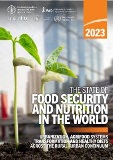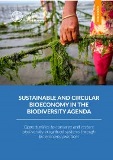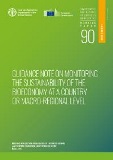Accelerate > Publications
Search this online library featuring the latest FAO publications, issue papers and briefs which offer up-to-date knowledge and innovative insights for SDG acceleration.

FAO and the 2030 Agenda Follow-up and Review: Guidance Note for Regional and Country Offices
2023
The Guidance Note describes the process of the preparation of the VNRs and what FAO Regional and Country Offices need to be aware and mindful of when providing support to the national partners. It covers information about the importance of the follow-up and review process for the 2030 Agenda and the SDGs, including information about the gaps in the coverage of the Voluntary National Reviews, and recommendations on strengthening VNRs to be meaningful instruments for the acceleration of the SDGs.

The State of Food and Agriculture 2023 - Revealing the true cost of food to transform agrifood systems
2023
The State of Food and Agriculture 2023 looks into the true cost of food for sustainable agrifood systems. The report introduces the concept of hidden environmental, health and social costs and benefits of agrifood systems and proposes an approach – true cost accounting (TCA) – to assess them.

Sustainability by numbers - Forest products at FAO
2023
Over more than three-quarters of a century, FAO’s work on forest product statistics has made the Organization the recognized authority for data fundamental to what we now call the global bioeconomy. Forest product data are essential in monitoring impact and innovation in the global wood industry; responding to climate change by calculating carbon emissions; and developing equitable policies that uphold ecosystem services and forest values for our communities.

FAO SDG Action: Marking the mid-way point of the 2030 Agenda
2023
As we stand at the midpoint of the 2030 Agenda, it is both a moment of reflection and an opportunity to renew our commitment to achieving the SDGs. In August 2023, the FAO Office of SDGs launched a survey, receiving over 600 responses that shared valuable insights, experiences and actions taken by FAO offices towards the achievement of the SDGs. In addition this survey, FAO project data was leveraged to present this visual representation of FAO’s contribution to the 2030 Agenda implementation.

Tracking progress on food and agriculture-related SDG indicators 2023
2023
At the mid-point of the Agenda 2030 for Sustainable Development, there is an urgent need to understand where the world stands in eliminating hunger and food insecurity, as well as in ensuring sustainable agriculture. The new report of the Food and Agriculture Organization of the United Nations (FAO),offers analysis and trends on indicators across eight Sustainable Development Goals (SDGs) – in particular, SDGs 1, 2, 5, 6, 10, 12, 14 and 15.

The State of Food Security and Nutrition in the World 2023 - Urbanization, agrifood systems transformation and healthy diets across the rural–urban continuum
2023
This report provides an update on global progress towards the targets of ending hunger (SDG Target 2.1) and all forms of malnutrition (SDG Target 2.2) and estimates on the number of people who are unable to afford a healthy diet. Since its 2017 edition, this report has repeatedly highlighted that the intensification and interaction of conflict, climate extremes and economic slowdowns and downturns,...

2023 SDG Summit: FAO Key Messages
2023
The 2023 SDG Summit will serve as a pivotal event towards achieving the SDGs, as gathered Heads of State and Government are to carry out a comprehensive review of progress, respond to the impact of multiple crises, and provide high-level political guidance on transformative and accelerated actions for achieving the 2030 Agenda. FAO has developed these key messages to inform the discussions in the lead up to and during this Summit and the Political Declaration which will result from them.

Contribution of terrestrial animal source food to healthy diets for improved nutrition and health outcomes - An evidence and policy overview on the state of knowledge and gaps
2023
FAO’s Committee on Agriculture requested a comprehensive, science- and evidence-based global assessment of the contribution of livestock to food security, sustainable food systems, nutrition and healthy diets, considering environmental, economic and social sustainability. The assessment consists of four component documents. This first component document provides a holistic analysis of the contribution of terrestrial animal source food to healthy diets for....

Inclusive is not enough – Agrifood value chains need gender-responsive business development
2023
This brief, jointly developed by the FAO Regional Office for Africa and the FAO Regional Office for the Near East and North Africa, aims to trigger a critical reflection on the concept of “inclusive” agribusiness and propose a new definition that highlights the importance of considering gender equality and women’s empowerment as an integral component of agribusiness development.

Aspirational principles and criteria for a sustainable bioeconomy
2022
To promote the production, utilization, conservation and regeneration of biological resources in ways that support global food and nutrition security and sustainable development, it is necessary to have a holistic vision for a sustainable and circular bioeconomy. Through the International Sustainable Bioeconomy Working Group (ISBWG), a multistakeholder group established in 2016,...

Sustainable and circular bioeconomy in the biodiversity agenda - Opportunities to conserve and restore biodiversity in agrifood systems through bioeconomy practices
2022
The sustainable management of biodiversity contributes to addressing food and nutrition security, enhancing resilience, and providing livelihoods to local and indigenous communities that can diversify their activities and generate income.

Sustainable and circular bioeconomy in the climate agenda: Opportunities to transform agrifood systems
2022
The bioeconomy offers opportunities to reduce greenhouse gas (GHG) emissions along the agrifood system by replacing fossil-based resources and processes with biological ones, from microbiome innovations, biofertilizers and biopesticides, to alternative proteins, bio-based plastics and textiles, and biological waste management, to name just a few. A sustainable and circular bioeconomy also presents opportunities to improve climate change adaptation and resilience,...

Urban and peri-urban agriculture sourcebook - From production to food systems
2022
The purpose of this book is to set out the key lessons learned and to provide recommendations and guidance based on existing cases and examples for a wide range of actors involved in urban food systems. In particular, the aim is for this publication to serve as a sourcebook for local decision-makers, policy advisors, urban planners, specialists, practitioners and others involved in urban and peri-urban agriculture (UPA).

The future of food and agriculture – Drivers and triggers for transformation
2022
This report aims at inspiring strategic thinking and actions to transform agrifood systems towards a sustainable, resilient and inclusive future, by building on both previous reports in the same series as well as on a comprehensive corporate strategic foresight exercise that also nurtured FAO Strategic Framework 2022–31. It analyses major drivers of agrifood systems and explores how their trends could determine alternative futures of agrifood, socioeconomic and environmental systems.

The State of Food Security and Nutrition in the World 2022 - Repurposing food and agricultural policies to make healthy diets more affordable
2022
This year’s report should dispel any lingering doubts that the world is moving backwards in its efforts to end hunger, food insecurity and malnutrition in all its forms. We are now only eight years away from 2030, but the distance to reach many of the SDG 2 targets is growing wider each year. There are indeed efforts to make progress towards SDG 2, yet they are proving insufficient in the face of a more challenging and uncertain context.
Tracking progress on food and agriculture-related SDG indicators 2022
2022
Seven years into the 2030 Agenda, there is an urgent need to understand where the world stands in eliminating hunger and food insecurity, as well as in ensuring sustainable agriculture. FAO’s new report, “Tracking progress on food and agriculture-related SDG indicators”, offers analysis and trends on indicators across eight SDGs (1, 2, 5, 6, 10, 12, 14 and 15), highlighting areas of progress and areas where further effort is needed.

Enabling substitution by wood-based products and contributing to the Sustainable Development Goals
2022
This report addresses the role of forest products in replacing fossil-based and GHG-intensive products. The overarching objective is to provide recommendations to strengthen the contribution of substitution by forest products to sustainable development. To that end, this report firstly provides an overview of the understanding of the bioeconomy and the role of forest products across the world...

Guidance note on monitoring the sustainability of the bioeconomy at a country or macro-regional level
2021
This guidance note describes a series of general steps to establish an effective and robust system to monitor the sustainability of the bioeconomy in a given country or macro-region. This note builds on lessons learned from existing experiences of national and macro-regional bioeconomy monitoring systems. It was jointly developed by the Food and Agriculture Organization of the United Nations (FAO) and the European Commission’s Joint Research Centre (JRC),...

How to mainstream sustainability and circularity into the bioeconomy? A compendium of bioeconomy good practices and policies
2021
This Compendium outlines 250 sources of good practices and policies. It covers the entire continuum of economic sectors that have a stake in biological knowledge and resources. The Compendium, therefore, highlights the wide range of aspects that are included in the concept of the bioeconomy.

Consumer organizations and the right to adequate food - Making the connections
2021
Consumers are a powerful force for change towards a sustainably developing world that leaves no one behind and respects the human rights of all. This publication is aimed at making the connections between the important work of consumer organizations and the realization of the right to adequate food, increasing the visibility of these organizations and highlighting their importance to food security, healthy diets and food systems transformations.
Browse by SDG
- SDG1: No Poverty
- SDG2: Zero Hunger
- SDG3: Good Health & Well-being
- SDG4: Quality Education
- SDG5: Gender Equality
- SDG6: Clean Water & Sanitation
- SDG7: Affordable and Clean Energy
- SDG8: Decent Work and Economic Growth
- SDG9: Industry, Innovation and Infrastructure
- SDG10: Reduced Inequalities
- SDG11: Sustainable Cities and Communities
- SDG12: Responsible Consumption and Production
- SDG13: Climate Action
- SDG14: Life Below Water
- SDG15: Life on Land
- SDG16: Peace, Justice and Strong Institutions
- SDG17: Partnerships for the Goals
Browse by Better
Browse by Priority Area
- Innovation for Sustainable Agriculture Production
- Blue Transformation
- One Health
- Small-Scale Producers' Equitable Access to Resources
- Digital Agriculture
- Healthy Diets for All
- Nutrition for the Most Vulnerable
- Safe Food for Everyone
- Reducing Food Loss and Waste
- Transparent Markets and Trade
- Climate Change Mitigating and Adapted Agrifood Systems
- Bioeconomy for Sustainable Food and Agriculture
- Biodiversity and Ecosystem Services for Food and Agriculture
- Achieving Sustainable Urban Food Systems
- Gender Equality and Rural Women's Empowerment
- Inclusive Rural Transformation
- Agriculture and Food Emergencies
- Resilient Agrifood Systems
- Hand-in-Hand Initiative
- Scaling up Investment
